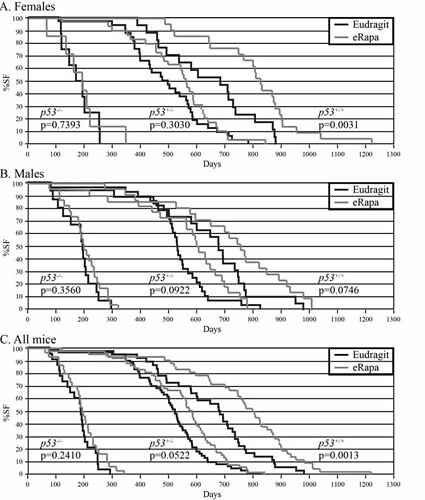P53 modifies the effectiveness of Rapamycin in mice. P53-/- mice had no life extension benefit from Rapa while other P53 mice had life extension similar to ITP results.
Of note:
Most mice seem to die of lymphoma.
p53 genotype influenced rapamycin-mediated life span extension. eRapa did not significantly benefit p53-/- mice (Figure 1), which had median survival times (male + female) of 198.5 and 192 days for control- and eRapa-fed mice, respectively (p=0.2410). By contrast, eRapa extended the median survival of p53+/- (520 to 582 days, p=0.0522) and p53+/+ mice (681 to 802.5 days, p=0.0013). eRapa improved median survival more for p53+/- females compared to p53+/- males (15.5% vs. 13.7% increase) and more for p53+/+ females compared to p53+/+ males (20.9% vs. 11.6% increase), similar to previous reports [4, 35]. The p53 gene dose appears to directly correlate with rapamycin’s effectiveness at extending mouse life span.
Chronic eRapa treatment did not significantly change tumor incidence in p53-deficient mice. Necropsies were performed on moribund mice after sacrifice or soon after natural death. Potential tumor masses and abnormal tissues were analyzed. Cancer, mostly lymphoma, was the major pathology identified at the time of death for all genotypes (Table 1). With control chow, p53-/- mice had a higher lymphoma incidence than p53+/- or p53+/+ mice (70% vs. 59% and 53%, respectively). With eRapa chow, there was a lower trend in the incidence of lymphoma in p53-/- mice but corresponding higher trend in the incidence of sarcomas (including leiomyoma, rhabdomyosarcoma, hemangiosarcoma and osteosarcoma); there was a similar but less pronounced trend in p53+/- mice. Very little change was observed in wild type p53+/+ mice, similar to a report that showed eRapa had only a minor effect on tumor multiplicity or burden in genetically heterogenous mice [35].
